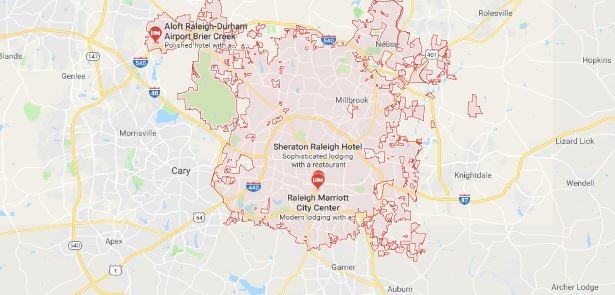The automatic collection of user location data from smartphones by tech companies, and the ability of law enforcement to access it via warrants will be discussed in Friday's AppleInsider podcast, with criminal defense attorney and former Apple employee T. Greg Doucette explaining how a recent report into the requests by Raleigh, N.C. police came about in the first place.
Speaking to AppleInsider podcast host Victor Marks, this week's guest T. Greg Doucette advises the revelations of Raleigh detectives submitting warrants to Google for user location data, listing devices that were near to a certain crime scene around the time the criminal act took place, all stems from a suspected arson investigation.
"In Raleigh about a year ago, a brand-new building that was under construction caught fire; It was one of biggest fires Raleigh has had in its 200-plus year history, and the police had no real leads," Doucette claims. "They believed after the inspection of the site it was arson, but they had no idea who would have done it."
"So, one of the ways they tried to figure that out is that they submitted a warrant to Google, basically asking for all Android devices that happened to be within a given geo-fence between a certain two hour period on a given day."
Confessing it was the first time he had seen a warrant like it, Doucette notes the Google request was also when the media discovered that type of warrant existed. The discovery led journalists to dig through other cases to find other situations where such requests were made.
Doucette says there is now work being carried out to assess how common the use of such warrants by law enforcement actually is, accompanied by a discussion about "whether or not it's even constitutional."
Public records reveal the Raleigh Police Department have used such warrants in at least four cases in the last year, and submitted at least 19 search warrants for Google data since 2015, though not all were for geofencing data. Only one of the four cases requesting the geofencing data have resulted in an arrest, with data supplied to the police months after the incident took place.
The vast amount of user location data available to search through is vast, in part due to the way that devices and apps work. "If you've got a laptop, or you're automatically participating in the program that periodically phones home to help improve the responsiveness, you know all of this stuff is out there," insists Doucette
"The question that end-users have to decide is 'how much benefit am I getting in exchange for giving up this information, and is that a fair trade-off for me?"
In his answer to the query, Doucette admits he gives up "way too much information to the cloud," but he is fine with this because he likes the technological advances that are made thanks to such data being provided back to developers and tech companies alike.
"I love the stuff that Apple has done with geolocation and proximity alarms and HomeKit and everything else, I like all of that stuff," the lawyer discloses. "But I'm also, like I said, I'm a technophile, so if had to go without it, it would take a period of adjustment and I probably would not like my life as much."
For those worrying about their privacy, he suggests "If it's something where you're not accustomed to the stuff - you don't use it, you don't care about it - then you can start making changes to limit how much of your life is still exposed to the outside world."
The full interview with T. Greg Doucette can be listened to on Friday on the AppleInsider podcast. The AppleInsider podcast is available on iTunes and your favorite podcast apps by searching for "AppleInsider."
 Malcolm Owen
Malcolm Owen







-m.jpg)






 Charles Martin
Charles Martin
 Christine McKee
Christine McKee
 Wesley Hilliard
Wesley Hilliard

 Andrew Orr
Andrew Orr
 William Gallagher
William Gallagher
 Sponsored Content
Sponsored Content








9 Comments
Exposing yourself to the outside world can be quite embarrassing!
I don’t mind the geolocation data being given to the police, as long as there is a warrant. What I do question is it’s effectiveness in solving crimes (like the one mentioned). There’s going to be an enormous number of people passing through the location...
On the other hand, if the police already have a suspect and he say “I was at home during that time” checking the geolocation data absolutely makes sense...
My worry is we end up with “big brother” because cops get lazy. The last mass shooting happened because the FBI got lazy...
If the law enforcement agencies focus on snooping, rather than detective work we (the people) lose. Technology isn’t the answer to every problem, sometimes it’s a waste of resources.